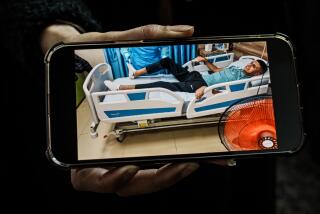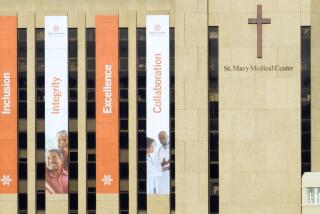500 at Memorial Service Mourn 2 Slain at Hospital : Tragedy: Meanwhile, a brother of the man accused of the Mission Bay hospital killings says that his father received inadequate treatment there and that the family may sue.
- Share via
Gathering under cloudy skies, about 500 mourners sobbed and hugged one another in the parking lot at Mission Bay Memorial Hospital on Thursday morning, sharing tears and tales of Deborah Kay Burke and Edward Thomas Rooney, two hospital workers slain in an emergency-room shooting rampage last weekend.
Burke was remembered as a funny, compassionate and caring person who was flourishing as a registered nurse practitioner at the hospital, a job she had held for a dozen years. Rooney, who died on his first day at the hospital, was recalled as an ambitious young man just embarking on a career in medicine.
Meanwhile, the brother of Bradford Warren Powers Jr., the man accused of killing Burke and Rooney and wounding two others, said his family is considering filing a medical malpractice lawsuit against the hospital for the way it treated his father, Brad Powers Sr.
The elder Powers died in the emergency room Saturday morning. Eight hours later, according to police, Bradford Powers Jr. returned to the emergency room and shot the four people.
His brother, Charles B. Powers, said in an an interview Thursday that the family does not believe the father received adequate medical attention. “It’s definitely a malpractice situation,” he said.
However, hospital officials and doctors insist that everything possible was done to save the life of the ailing 75-year-old La Jolla man.
Under a large, flower-filled tent set up in the parking lot, the hourlong service included piano music and short eulogies, highlighted by remembrances from co-workers, family and friends.
Rooney, 30, was remembered as being so keen on learning that he sat in on three classes of the emergency medicine course, even though his instructor, Cathy Douglas, tried to shoo him away by insisting that the course was full. Douglas, who taught the class at Miramar College, finally relented and allowed Rooney to enroll.
To graduate, Rooney and the other students had to spend eight hours observing an ambulance crew and eight hours watching in an emergency room.
“When Rooney called to schedule time in the emergency room, he kept vacillating, saying, ‘I want to see some action. Put me on when I can see some real action,’ ” Douglas said.
Rooney was raised in San Gabriel with two brothers and a sister, and was engaged to be married in October. He was three hours into his shift at the hospital when he was fatally shot.
Burke, however, had worked there for 12 years. A self-described “aerobics-olic,” Burke had cared for the elder Powers, a regular in the emergency room who would say he was coming to see “his girls.”
Burke died about two hours after being shot in the emergency room, where she had worked to help Powers and so many others.
The 36-year-old nurse had already contemplated the possibility of her death when she considered donating her kidney to an ailing sister. A donor was found, however, and Burke was spared from what could have been a risky operation, said her boyfriend, Eric Schmidt. He and Burke had planned to travel to Europe next month.
Burke was born in Virginia, but had spent most of her years in Kansas City, Mo. She was a real “vagabond,” said Schmidt, who added that Burke had never accumulated more possessions than could fit in her old car.
When Schmidt and others spoke of Burke, their reminiscences were laced with humor. They recalled how she had been a top official of the hospital’s Pee-wee Herman Fan Club. When struggling with an overweight patient, Burke would whisper: “Code Orca. Code Orca.”
“She was hard-headed but soft-hearted,” said her sister, Julie Whitsman of Gainesville, Va.
In an appeal that was applauded by the crowd, her mother, Florence D. Burke of Kansas City, stood before the mourners and called for tougher gun laws.
“It is long overdue for the Washington hierarchy on Capitol Hill to examine its conscience and implement stronger legislation on gun control,” she said. “It was a .22-caliber handgun that killed Debbie and Edward. Handguns kill people. Our judicial system needs to focus on the rights and protection of the victim--not the murderer.”
For Dan Glissmeyer, a 33-year-old paramedic who was summoned to the hospital minutes after the shooting and a friend of Burke, the memorial service and the gunman’s rampage only made him more aware of the dangers of his work.
“Physicians and all of us in the medical community have always felt that we had immunity because we don’t take sides, we take care of people. But with this, violence has escalated to a new level--it does make me feel vulnerable,” Glissmeyer said.
But hospital officials say they plan no major changes in hospital security.
“The nature of the emergency room is access,” said Kenn S. George, chief executive officer of Epic Healthcare Group, a chain of 39 employee-owned hospitals including Mission Bay.
“You are here to do a service to society, and access to the facility is key. What are you going to do? Make everyone go through a metal detector to get into an emergency room?”
He and others felt there was little to protect hospital workers from such unexpected violence.
“Truth is that no one is promised a tomorrow,” said Julie Whitsman, Burke’s sister.
Brad Powers Sr. had gone to the hospital last Friday and was treated for shortness of breath. He returned Saturday morning, and doctors discovered an abdominal aneurysm, a condition that they say was not present Friday. An aneurysm is a ballooning of a blood vessel.
Saying that surgery represented the elder Powers’ only chance to live, doctors decided to operate. But the patient suffered a heart attack and died on the operating table.
“I don’t think anything the hospital has said has been accurate,” said Charles Powers, who works as an architect. “An aneurysm the size of an orange doesn’t occur overnight.”
Hospital Executive Director Steve Hall said the hospital stands by its version of events and that the staff had tried to save the elderly man.
“Everything was done perfectly. The care was beyond expectations,” Hall said. “I wish the family the very best in these most adverse circumstances and feel sorry for them.”
More to Read
Sign up for Essential California
The most important California stories and recommendations in your inbox every morning.
You may occasionally receive promotional content from the Los Angeles Times.













